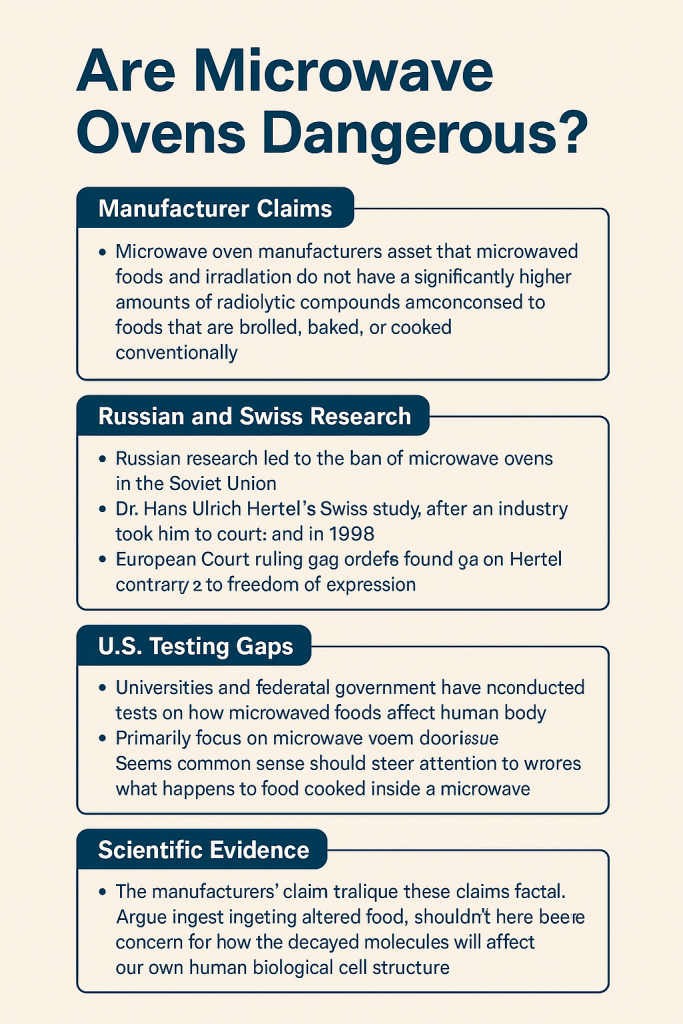For most of us, the microwave sits quietly in the kitchen—reliable, familiar, and barely questioned. It’s entirely valid to stop and ask what long-term effects a microwave might have on our health. This isn’t just speculation—when court rulings, shelved studies, and industry pressure enter the picture, it’s clear this topic needs closer scrutiny.
Did the Soviets Think Microwave Ovens Were Dangerous?
In the 1970s, Soviet researchers studied the effects of microwaved food on the body. Their findings concerned officials enough to remove microwave ovens from public use for a time.
The Soviets banned microwaves outright—so why didn’t other nations investigate the reasons behind that move?
The Swiss Scientist Who Sparked the Microwave Health Debate
A Swiss scientist questioned whether microwave-heated food could impact the body’s internal systems. He ran a limited trial to observe how the blood responded after people ate food prepared in a microwave.
His findings didn’t lead to more research—instead, they triggered resistance and an active push to silence the discussion. His case reignited a deeper question: if microwaves alter the food we eat, are microwave ovens dangerous in ways we haven’t truly considered?
A Human Rights Win for Questioning Microwave Oven Safety
Eventually, the dispute reached the European Court of Human Rights. The court overturned the gag order and ruled in his favour, awarding financial compensation for the injustice.
That ruling supported his right to speak openly. It also reinforced the idea that raising questions about consumer safety deserves protection—not punishment.
Why Hasn’t the Research on Microwave Oven Safety Been Done?
With microwaves used in homes worldwide, you’d expect plenty of reliable research into how they affect health through the food we eat. Yet strangely, that type of study—especially in the US—is often missing.
Regulators mainly examine the appliances themselves, checking for radiation leaks or faulty doors. Surely, the bigger issue lies in how the food changes—and what those changes might do to the people consuming it. Are microwave ovens dangerous because of these overlooked changes?
Are Radiolytic Compounds a Hidden Risk?
Manufacturers often claim that microwaving food doesn’t produce more harmful compounds than other cooking methods. Some experts continue to question whether microwave heating creates radiolytic compounds—subtle molecular changes that might not occur with other cooking methods.
Steaming or baking usually avoids creating these unusual molecular by-products. Some researchers believe these altered molecules could affect our cells, yet large-scale testing is still lacking. That’s what keeps the question alive—are microwave ovens dangerous because of what’s left behind in the food?
Microwaves, Nutrition Loss & Plastic Warnings
The microwave might not release harmful radiation, but its cooking method can still affect the quality of what we eat. Studies suggest that microwave heat breaks down nutrients such as vitamin C and B12 more rapidly than traditional cooking.
Reheating food in plastic often releases BPA and phthalates—two chemicals that disrupt hormones when absorbed into the body. The bigger concern may not be the device itself, but our habits—what we’re heating, how long for, and in what kind of container. This leads many to ask—do microwave ovens become harmful depending on how we use them?
Are Microwave Oven Manufacturers Hiding Something?
Let’s be honest—when companies fear profit loss, they rarely welcome criticism. Rather than supporting open investigation, certain brands appear more interested in managing how the public views the issue.
The Swiss researcher’s experience shows how easily powerful interests can suppress findings that don’t align with their goals. Many people avoid questioning mainstream ideas because they’re quickly dismissed as conspiratorial or irrational. Still, if microwaving transforms food on a molecular level, isn’t it fair to ask: are microwave ovens dangerous in ways we don’t yet understand?
So, Are Microwave Ovens Dangerous or Not?
Modern microwaves don’t usually pose obvious risks like burns or radiation exposure. However, the real concern may lie in how they change the food—and what that food does inside us.
While we wait for proper long-term studies, it’s worth following a few commonsense tips:
-
Use ceramic or glass containers
-
Avoid reheating food in plastic
-
To keep nutrients intact, try steaming citrus or flash-cooking leafy greens in a hot pan for a short time
Asking how everyday technology affects the meals we eat is not only reasonable—it’s responsible. So we return to the core issue: are microwave ovens a hidden health risk, or have we just been looking the other way?.
We hope that you found this article of value, it isn’t to scare you. Only to make you aware that we must not believe everything that the ones in charge tell is is for our own well being. Below are a few more posts that you may well enjoy.





